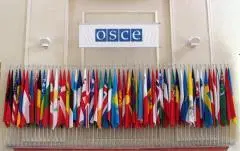
Flags of the 57 OSCE participating countries. (Photo: OSCE/Mikhail Evstafiev)
(CNSNews.com) – More than half of the members of a 30-strong international monitoring team deployed by the Organization for Security and Co-operation in Europe (OSCE) to observe the U.S. election come from countries that are ranked “not free” or “partly free” in an annual assessment of political rights and civil liberties in the nations of the world.
The election observation mission is tasked to “assess whether the elections are held in line with OSCE commitments and other international obligations and standards for democratic elections, as well as with national legislation.”
Three of the 30 long-term observers hail from Azerbaijan and Tajikistan, both ranked “not free” in 2020 by the veteran democracy watchdog Freedom House. Another 13 come from eight countries deemed “partly free” – one each from Albania, Armenia, Bosnia, Georgia, and Moldova; two each from North Macedonia and Serbia; and four from Montenegro.
The remaining 14 come from free democracies – three Czechs, nine Germans and two Swiss nationals.
In addition to the 30 observers who arrived earlier this month, a core team of experts also on the ground comprises 15 members, one of whom comes from a “not free” country (Tajikistan) and another six from five “partly free” countries (Armenia, Georgia, Kyrgyzstan, North Macedonia, Serbia).
The OSCE is a grouping of 57 nations in Europe, Central Asia and North America. Most are full or flawed democracies, but it also includes seven autocratic former Soviet republics – Azerbaijan, Belarus, Kazakhstan, Russia, Tajikistan, Turkmenistan, and Uzbekistan – as well as Turkey. The organization stresses that members of observer missions do not represent their governments, although their governments do select them, and cover their expenses.
The two “not free” governments that selected nationals to take part in the current mission in the U.S. are among the worst-scoring in the Freedom House assessment: Out of 49 countries in the “not free” list, they are in the 9th and 14th places from the bottom.
Tajikistan earns 0 out of a possible 40 points for political rights. President Emomali Rahmon, who holds the official title of “leader of the nation,” has ruled since 1992, and constitutional amendments ratified in 2016 removed presidential term limits specifically for him.
The country has no record of peaceful transfer of power between rival parties, according to Freedom House, and “the political opposition has been devastated by a sustained campaign of repression in recent years, and the government exerts tight control over religious expression and activity.”
Azerbaijan scores 2 points out of 40 for political rights. President Ilham Aliyev has been in power since 2003, and no term limits apply.
“Corruption is rampant, and the formal political opposition has been weakened by years of persecution. The authorities have carried out an extensive crackdown on civil liberties in recent years, leaving little room for independent expression or activism.”
Under a 1990 agreement, OSCE members allow observers from the group to monitor their elections, “to the extent permitted by law,” and U.S. elections have been monitored since 2002.
The OSCE’s Office for Democratic Institutions and Human Rights (ODIHR) oversees the process. Ordinarily it would have sent a more substantial mission to the U.S. in a presidential election year, including short-term monitors deployed on Election Day, but COVID-19 travel and other restrictions made that impossible, so the organization reverted to a “limited” model.
Areas being focused on by the 2020 mission include federal and state election legislation; election administration, including voter registration, identification, alternative voting mechanisms and measures to ensure vote secrecy; constituency delimitation; new voting technologies; the campaign environment; campaign finance; and media coverage.
‘Strict political impartiality’
A report issued by the OSCE/ODIHR observation mission of the 2016 election said they were “highly competitive and demonstrated commitment to fundamental freedoms of expression, assembly and association.”
But it also included some candid criticism of Republican nominee Donald Trump.
“The two major candidates offered distinct policy alternatives, but often used highly charged rhetoric and employed personal attacks,” it said. “Intolerant speech by one candidate was frequent, including about women, minorities and people with disabilities.”
“The media is pluralistic and vibrant, although increasingly polarized,” it said. “A robust system of protection for media independence is in place, but hostility towards the media’s role as a critical watchdog was voiced by one presidential candidate.”
Apart from the OSCE/ODIHR mission, an associated but separate one by the OSCE Parliamentary Assembly will involve “more than 100” observers, including some 80 lawmakers from 30 OSCE countries. Their nationalities have yet to be made public.
The monitors are bound by a code of conduct that includes a requirement to “maintain strict political impartiality at all times.” (One Greek observer who tweeted in support of Hillary Clinton in 2016 was quickly dismissed.)
According to the National Conference of State Legislatures, international observers are prohibited from monitoring elections in 11 states – Alabama, Alaska, Arizona, Connecticut, Florida, Louisiana, Mississippi, Ohio, Oklahoma, Tennessee, and Texas.
In each case, statutory language either explicitly forbids international observation, or it has been interpreted to do so.







